只能接ing分词作宾语的动词
动词ing的五种用法

动词ing的五种用法动词的 ing 形式,也就是现在分词和动名词,在英语中有着广泛且重要的用法。
接下来,咱们就一起来详细了解一下动词 ing 的五种常见用法。
一、作主语动词 ing 形式作主语时,表示经常的、习惯性的动作或者是抽象的概念。
比如:“Swimming is my favorite sport”(游泳是我最喜欢的运动。
)在这个句子中,“swimming”就是动词 ing 形式作主语,强调游泳这个活动整体。
再比如:“Reading aloud is very helpful”(大声朗读非常有帮助。
)这里“reading aloud”作为主语,指的是大声朗读这种行为。
需要注意的是,动词 ing 形式作主语时,谓语动词要用单数形式。
二、作宾语有些动词后面只能接动词 ing 形式作宾语,常见的这类动词有:enjoy(喜欢),finish(完成),practise(练习),mind(介意),suggest(建议)等。
例如:“I enjoy reading books in my spare time”(我喜欢在业余时间读书。
)“enjoy”后面就接了“reading”这个动词 ing 形式。
“Have you finished doing your homework?”(你做完作业了吗?)“finish”后面接“doing”。
“Would you mind opening the window?”(你介意打开窗户吗?)“mind”接“opening”。
三、作表语动词 ing 形式作表语时,往往表示主语所具有的特征或性质。
例如:“The story is very interesting”(这个故事很有趣。
)“interesting”就是动词 ing 形式,用来描述“the story”的性质。
再比如:“His job is teaching English”(他的工作是教英语。
)“teaching English”作为表语,说明了他的工作内容。
(完整版)高中英语语法——动词ing形式的用法

3. 在介词后接动名词作宾语
1) I insist on taking proper food for this trip. 2) Instead of smiling, each of them made a face. 3) She was very interested in working for our company.
1)Walking is a good form of exercise for both
young and old. 2)Watching news on TV has become a routine
for me. 3)Going to Hangzhou by train takes about
没有比……更糟的 • There is/was no point doing 做……无意义
Try to tell the meaning of each sentence.
1)There is no hiding of evil but not to do it. 若要人不知, 除非己莫为。 2)There is no joking about such matter. 这种事开不得玩笑。 3)There was no knowing when he would leave. 无法知道他什么时候离开。
归纳: 常用-ing形式作主语的句型有: • It +be +a waste of time doing • It is/was no good/use doing • It is/was hardly/scarcely worth doing • It is/was worth/worthwhile doing • There is no doing...无法……; 不允许……
英语语法歌诀

出现并列主语特殊记,“就近原则”用仔细。
There be 句型的状语歌诀:
There be 放句首,主语跟在后。
地,时放句末,强调置前头。
There be 句型“对划线部分进行提问”歌诀:
提问主语较简单,须用“What’s/Who’s+地点”。
提问地点容易记,“Where is/are+主语”用仔细。
直引若是特殊问,疑问词连接记心间。其余问题挺简单,一切只当一般问。
直引若是祈使句,谓语动词挺要紧。 told\asked\ordered,根据口气来选定
。告诉人、请人、命令人,后跟to do sth.。若是否定祈使句,not to do后边行。
时间名词前所用介词的速记歌:
年月周前要用in,日子前面却不行。
4 有些以-eep结尾的动词的过去时是把-eep改为-ept.
如:keep→kept,sweep→swept,sleep→slept等
有些以-ow结尾的动词的过去时是把-ow改为-ew.
如:grow→grew,blow→blew,know→knew,throw→threw等.
有些以-end结尾的动词的过去时是把-end改为-ent.
一听二看三感觉,have,let和make
若是后面跟宾补,小to一定要省略
关于动词help,带不带to不算错
宾补改为被动句,带上小to莫忘记
形容词的语序排列:
限定词位置排第一,描绘大小、长短和高低。
形状、年龄新旧色,接着再说啥国籍。
基本特征放在后,物质材料和用途。
介词后不定式省to的情况:
巧记以-o结尾加-es的词:
动词ing形式的用法及变化规则

动词ing形式的用法及变化规则动词-ing形式包括传统语法的动名词和现在分词两个部分。
动词的-ing形式具有动词的特征,同时又具有名词、形容词和副词的特征,因此它可以在句中作主语、表语、定语、宾语、宾语补足语和状语。
动词现在分词由动词原形在词尾加ing构成,其规则如下:1)一般情况下直接加ingthink---thinking sleep---sleeping study---studying speak---speaking carry---carrying say---saying2)以不发音的字母e结尾的单词,去掉字母e,再加ingwake---waking make---making come---coming take---taking leave---leaving have---having3)以重读闭音节结尾,呈现“辅,元,辅”结构的动词,先双写末尾的辅音字母,再加ing 。
初中学过的这类词有:begin,cut, get, hit, run, set, sit, spit, stop, swim, beg, drop, fit, nod, dig, forget, regret, rid, 等。
visit 不是以重读闭音节结尾,不用双写travel虽然重读第一音节,词尾音节不重读,但是现在分词仍要双写末尾辅音字母,然后再加ing ,如:travel---travelling. 初中阶段此类词只有这一个。
4)以 y 结尾的动词直接加 ingcarry—— carrying enjoy—— enjoying5)以ie结尾的动词,把ie改为y ,再加ingdie---dying lie---lying要特别注意有些动词没有进行时态.1、表示状态、思想、感情和感觉的动词,如:see, hear, love, know, want, hope, think等,没有进行时态。
2、当have/has作为“拥有”时,没有进行时态,但表示“开会,吃饭,玩得高兴”等意思时,可以用进行时表达。
动词+ing的规则
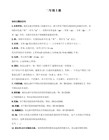
这样做没有害处。
--------------------------------------------------------------------------------
作表语
动词 -ing可用来作表语。如:
4.有些动词既可能带-ing分词作宾语,也可以带to不定式作宾语,但在语义上却有很
大的差别。如:
⑴chance to do 碰巧去做某事
chance doing 冒险试一试做某事
⑵forget to do 忘记要去做某事
forget doing 忘记曾做过某事
⑶go on to do 接着又做另一件事
regret doing 对做过的事表示遗憾
⑻mean to do 打算/想做某事
mean doing 意味着/意思是做某事
--------------------------------------------------------------------------------
********************
解释三
1.一般在动词原形末尾加ing
2. 以不发音字母e结尾的动词,去e,再加ing
3. 以重读闭音节结尾的动词,如果末尾只有一个辅音字母,应先双选这个字母,再加ing
4.还有几个特殊的。。。
一共有三种:
1.直接加ing
react to等。
Do you feel like having a drink?
你想喝点饮料吗?
I prefer s
wimming to playing basketball.
动词ing形式作主语和宾语(知识梳理)

动词ing形式作主语和宾语(知识梳理)动词--ing形式作主语和宾语动名词是非谓动词的又一种形式。
它在形式上与现在分词相同,都是在动词原形的词末加-ing。
在现代语法中,这两种形式同视为"-ing形式"。
这两种形式的另一个相同之处是:它们都是由动词变化而成的,它们都保留了动词的某些特征,它们都能带自己的宾语、状语,而构成动名词短语或是现在分词短语去担当句子成分。
动名词- 概述动名词是非限定动词的一种形式,由动词原形+ing构成。
它既有动词的特征,又有名词的特征,故称。
动名词也有时态和语态的变化,如表所示(以及物动词write为例),不及物动词没有语态的变化。
时态/语态主动被动一般式writing beingwritten完成式havingwritten having been written动名词- 动名词的结构和形式(1)逻辑主语是有生命的名词作主语时,必须用名词或代词所有格,作宾语时(尤其在口语中),也可用名词普通格或人称代词宾格。
如:Do you think my going there will be of any help? 你看我去会有什么帮助吗?(宾语)The student’s knowing English w ell helps him in learning French.这位学生通晓英语对他学法语很有帮助。
(主语)Do you mind my(me) smoking ?你介意我抽烟吗?(宾语)They insist on Mary’s (Mary) going with them there.他们坚持要玛丽跟他们一起去那儿。
(介词宾语)(2)逻辑主语是无生命名词是,通常只用名词普通格。
如:Do you hear the rain pattering on the roof?你听见雨点打在屋顶上了吗?Is there any hope of our team winning the match ?我们对赢得比赛有希望吗?(3) 逻辑主语是指示代词或不定代词this,that , somebody , someone , nobody, none, anybody,anyone 时,只用普通格。
动词ing形式.

3) I shall never forget seeing the famous writer. 我___永__远__不__会__忘__记__见__到__过__那__位__著__名__ 作__家__。_
4) Don’t forget to write to your mother. 不__要__忘__了__给__你__母__亲__写__信__。_
B. 在begin/start, continue之后,用动 词-ing和不定式,意义无甚区别, 尤其是当主语是人的时候。
C. 在动词forget,remember,regret之 后,用动词-ing与不定式意义不同。 动词-ing表示动作先于谓语发生, 不定式表示后于谓语动作,如:
1) I remember posting the letter. 我记得我已把信寄了。
三、-ing形式作表语 -ing形式作表语时放在系动词之后,
用来泛指某种动作或行为,以说明主 语的身份、性质或情况。如:
Her hobby is painting. 她的业余爱好是画画。
My job is looking after the children. 我的工作就是照顾这些孩子。
His concern for his mother is most touching. 他对母亲的关爱很感人。 She was very pleasing in her appearance.
in time.
2) 我们用别的方法做这工作试试。 Let’s try doing the working in some other way.
3) I didn’t mean to make you angry. 我__并__不__想__叫__你__生__气__。_
非谓语动词用作宾语和宾语补足语
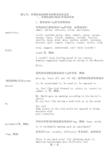
determine, dislike, endeavour, expect, fail, fear,
John's house in the country wants painting.
John's house in the country wants to be painted.
这两种结构意义相同。
require, start, try, want 等。
在有些动词后面, 两种结构之间的意义差别不大。例如:
He prefers writing (to write) an outline before he
stand 等, 例如:
I couldn't help feeling proud of our country.
Someone suggested organizing an outing to the Western
excuse, fancy, finish, imagine, include, involve,
justify, keep, mind, miss, pardon, permit, postpone,
prevent, quit, regret, require, resent, resist, risk,
stop, suggest, understand, can't help (couldn't help),
tend, think,threaten, try, undertake, want, wish 等。例如:
Don't hesitate to ask me questions if you don't
高中英语语法——动词ing形式的用法

building materials = materials for building 建筑材料
drinking water = water for drinking a walking stick = a stick for walking a reading room = a room for reading a writing desk = a desk for writing tiring music = music that is tiring a surprising result= a result that is surprising
They heard him singing in the next room.
D. 意义各不相同 try to do (设法) mean to do (打算, 有意要做) try doing (试试) mean doing (意思是, 意味着) be used to doing 习惯于做某事 be used to do 被用来做某事 can’t help doing 禁不住做某事 can't help to do 不能帮助做某事
2. –ing 形式短语作定语时, 放在所修饰的名词之 后, 并且在意思上相当于一个定语从句。
1)They lived in a room facing the street. = They lived in a room that faces the street. 2)The man standing there is Peter’s father. = The man who is standing there is Peter’s father. 3)Anybody swimming in this river will be fined. = Anybody who is swimming in this river will be fined.
动词的 -ing形式与动词的搭配问题
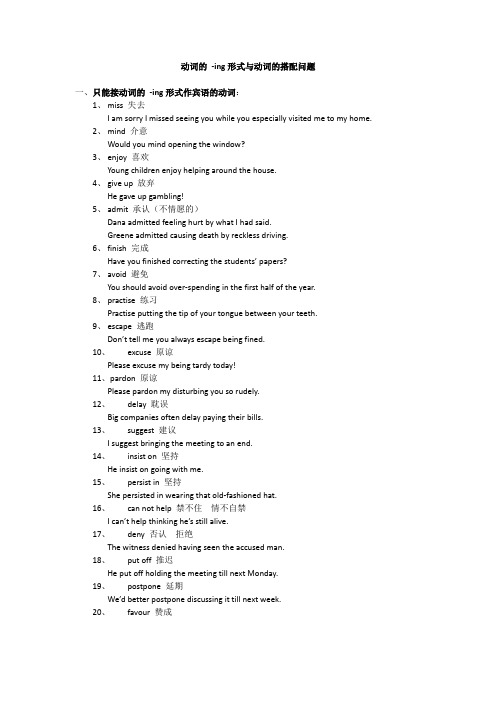
动词的-ing形式与动词的搭配问题一、只能接动词的-ing形式作宾语的动词:1、miss 失去I am sorry I missed seeing you while you especially visited me to my home.2、mind 介意Would you mind opening the window?3、enjoy 喜欢Young children enjoy helping around the house.4、give up 放弃He gave up gambling!5、admit 承认(不情愿的)Dana admitted feeling hurt by what I had said.Greene admitted causing death by reckless driving.6、finish 完成Have you finished correcting the students’ papers?7、avoid 避免You should avoid over-spending in the first half of the year.8、practise练习Practise putting the tip of your tongue between your teeth.9、escape 逃跑Don’t tell me you always escape being fined.10、excuse 原谅Please excuse my being tardy today!11、pardon 原谅Please pardon my disturbing you so rudely.12、delay 耽误Big companies often delay paying their bills.13、suggest 建议I suggest bringing the meeting to an end.14、insist on 坚持He insist on going with me.15、persist in 坚持She persisted in wearing that old-fashioned hat.16、can not help 禁不住情不自禁I can’t help thinking he’s still alive.17、deny 否认拒绝The witness denied having seen the accused man.18、put off 推迟He put off holding the meeting till next Monday.19、postpone 延期We’d better postpone discussing it till next week.20、favour赞成21、Understand 明白I can understand her wanting to live alone and be independent.22、Risk 冒险I can’t help wondering whether we should risk going without raincoats.23、Keep 保持News of successes keeps pouring in.24、Fancy 想象Sorry, but I don’t fancy going out tonight.25、Endure 容忍忍受The lazy bones didn’t fancy getting up at 4 o’clock every morning.26、Dislike 厌恶I dislike getting up early.27、Consider 考虑He was in low ebbs and considered going away.28、Anticipate期望预料We anticipate hearing from you again.29、Appreciate 感激I really appreciate your telling me that.30、Acknowledge 承认Mr. Smith acknowledged receiving the book.31、Imagine 想象I can’t imagine him knowing all that.32、Advocate 拥护主张He doesn’t advocate getting up too early.33、Facilitate 促进是便利Tape recorder facilitates studying English.34、Involve 包括House-keeping involves cooking, washing dishes, sweeping, and cleaning.35、Resent 厌恶He resented being asked to wait.36、Detest 厌恶She said she had always detested seeing a bull fight.37、Loathe 非常厌恶I’d rather go by sea, I loathe flying.38、Ensure 保证确保I can’t ensure his being there in time.39、Can’t resist 忍不住I can’t resist seeing chocolates.40、Resent 怨恨不快Does he resent my being here?41、Evade 逃避Evade paying taxes42、Mention 介意My wife didn’t mention my writing to my private secretary.43、Forbid 禁止The law forbids selling liquor to minors.44、Contemplate 打算注视I hope you would contemplate coming with us on the trip.45、Defer 暂缓延期They deferred making a decision.46、Recall 回忆记起I can’t recall having met him before.47、Approve 批准同意Exercise 1 Put the verbs in brackets into the correct forms, choosing between the –ing participle and the infinitive:1.He was in low spirits and even considered(go) away.2.The criminal even threatened (murder) the president.3.Practise (put) the tip of your tongue between your teeth and blowing: You will pronounceperfect th’s!4.You must endeavour __________ (explain) yourself more clearly, it is impossible _________(understand) what you are trying _________ (say).5.Bob contemplated _____________ (go) to Africa after graduation.6.I can’t help __________ (wonder) whether we should risk ________ (go) without raincoats.7.Don’t tell me you always escape __________ (be) fined because you have a very fast sportscar!8.Leave off ________ (bite) your nails.9.My mother detested ___________ (go) to classical concerts so I never learned ________(appreciate) classical music until I was old enough ___________ (start) a collection of records.10.He didn’t feel like _________ (work) so he suggested _________ (spend) the day in thegarden.11.You still have a lot _________ (learn) if you’ll forgive my ________ (say) so.12.Tim decided ___________ (put) broken glass on top of his wall ________ (prevent) boys________ (climb) over it.13.You certainly mustn’t miss ________ (see) this wonderful film.14.Do you recollect/recall ___________ (tell) John about the new house?15.The doctor advised ___________ (take) the car.16.I could not imagine that ________ (be) possible.二、即可接动词–ing形式,又可接动词不定式作宾语的动词:(一)接两种形式,意义无太大区别的动词如表示一般行为,用分词结构作宾语为多,如表示特定的活具体的动作,则用不定式作宾语为多。
英语记忆口诀
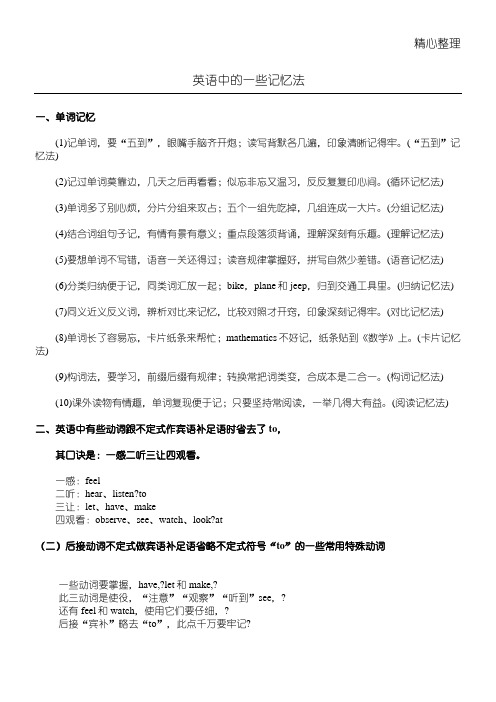
精心整理英语中的一些记忆法一、单词记忆(1)记单词,要“五到”,眼嘴手脑齐开炮;读写背默各几遍,印象清晰记得牢。
(“五到”记忆法)))))(归纳记忆法))(8)单词长了容易忘,卡片纸条来帮忙;mathematics 不好记,纸条贴到《数学》上。
(卡片记忆法)(9)构词法,要学习,前缀后缀有规律;转换常把词类变,合成本是二合一。
(构词记忆法)(10)课外读物有情趣,单词复现便于记;只要坚持常阅读,一举几得大有益。
(阅读记忆法)二、英语中有些动词跟不定式作宾语补足语时省去了to,其口诀是:一感二听三让四观看。
不带to的不定式作宾补不定式,不带to,九个动词要记住,一听(hear)二看(see, watch)三感觉(feel, notice, observe),make, let和have;作宾补,是秃头;当主补时要带to.三、关于“some time”分开“一段时间”,?some?time表示“一段时间”;?相聚“在某一时”,sometime表示“在某一时”;?“有时”相聚加s,sometimes表示“有时,不时”;?“几次”分开带s,some?times表示“几次,次数”。
1.有水无湖:海、洋、海湾、河等,都用the;单个湖不用the,(但多个湖用the);the?Red?Sea, the?Pacific?Ocean, the?Persian?Gulf,?the?Yangtze?River The?Great?Lakes(五大湖);Lake?Erie(伊利湖)2.有球无星:地球,月亮用the;行星不用the:?Mars, Venus;3.有山无峰:The?Huangshan?Mountains(黄山);Mount?Everest(珠穆朗玛峰);Mount(or?Mt.)?Tai(泰山)4.有独无欧(偶):独一无二的,the?earth, the?moon, the?sun用the;欧洲等七大洲不用the.Europe, Africa, Asia, North?America, South?America, Antarctica, Oceania5.有(足)族无球(运动):种族用the: the?Indians(印第安人);球类运动baseball, basketball6.有文无章:历史性的文件用the;小说等的章节不用the7.had回答问题要简洁,并列重复须省略。
英语记忆口诀
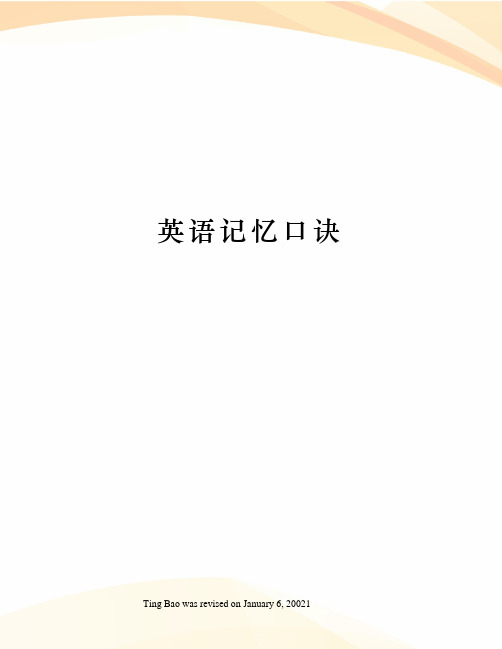
英语记忆口诀 Ting Bao was revised on January 6, 20021英语中的一些记忆法一、单词记忆(1)记单词,要“五到”,眼嘴手脑齐开炮;读写背默各几遍,印象清晰记得牢。
(“五到”记忆法)(2)记过单词莫靠边,几天之后再看看;似忘非忘又温习,反反复复印心间。
(循环记忆法)(3)单词多了别心烦,分片分组来攻占;五个一组先吃掉,几组连成一大片。
(分组记忆法)(4)结合词组句子记,有情有景有意义;重点段落须背诵,理解深刻有乐趣。
(理解记忆法)(5)要想单词不写错,语音一关还得过;读音规律掌握好,拼写自然少差错。
(语音记忆法)(6)分类归纳便于记,同类词汇放一起;bike,plane和jeep,归到交通工具里。
(归纳记忆法)(7)同义近义反义词,辨析对比来记忆,比较对照才开窍,印象深刻记得牢。
(对比记忆法)(8)单词长了容易忘,卡片纸条来帮忙;mathematics不好记,纸条贴到《数学》上。
(卡片记忆法)(9)构词法,要学习,前缀后缀有规律;转换常把词类变,合成本是二合一。
(构词记忆法)(10)课外读物有情趣,单词复现便于记;只要坚持常阅读,一举几得大有益。
(阅读记忆法)二、英语中有些动词跟不定式作宾语补足语时省去了to,其口诀是:一感二听三让四观看。
一感:feel二听:hear、listen?to三让:let、have、make四观看:observe、see、watch、look?at(二)后接动词不定式做宾语补足语省略不定式符号“to”的一些常用特殊动词一些动词要掌握,have,let和make,此三动词是使役,“注意”“观察”“听到”see,还有feel和watch,使用它们要仔细,后接“宾补”略去“to”,此点千万要牢记除此之外,还可以掌握“八字言”,一感feel,二听hear,listento,三让have,let,make,四看see,lookat,observe,watch不带to的不定式作宾补不定式,不带to,九个动词要记住,一听(hear)二看(see,watch)三感觉(feel,notice,observe),make,let和have;作宾补,是秃头;当主补时要带to.三、关于“sometime”分开“一段时间”,sometime表示“一段时间”;相聚“在某一时”,sometime表示“在某一时”;“有时”相聚加s,sometimes表示“有时,不时”;“几次”分开带s,some?times表示“几次,次数”。
动词ing形式变化规则 规则口诀是什么

动词ing 形式变化规则规则口诀是什么
动词-ing 形式包括传统语法的动名词和现在分词两个部分。
动词-ing 形
式具有动词的特征,同时又具有名词、形容词和副词的特征,因此它可以在
句中作主语、表语、定语、宾语、宾语补足语和状语。
“动词加ing”的规则
在英语中,ing 是动词的一种后缀(即在动词后加上该后缀),是进行时态
(be+doing)的动词一种分词形式,如:
He is doing his homework.(他正在写作业)
同时,某些动词之后加上该后缀可以变为其名词形式,如:
swim→swimming
动词变为进行时的规则:
动词以单个e 结尾,去掉e;加ing 动词以ee 结尾,直接加ing ,如:agree→agreeing;see→seeing
动词为单音节:以单一元音字母+ 单一辅音字母结尾,辅音字母双写
动词为双音节或者多音节:最后一个音节为重读音节,以单一元音字母+
单一辅音字母结尾,辅音字母双写,再加ing
以y 结尾的动词,直接加ing
后跟动词ing 形式的口诀
1.避免错过少延期avoid miss postpone 建议完成多练习suggest finish practise 喜欢想象禁不住enjoy imagine can’t help 承认否定与嫉妒admit deny envy 逃避冒险莫原谅escape wish excuse 忍受保持不介意stand keep。
动词ing做宾语句子

动词ing做宾语句子动词ing做宾语句子是英语语法中的一种结构,它是由动词的现在分词形式(-ing形式)作为宾语,加上一个主语和谓语动词组成的。
例如:I enjoy swimming. (我喜欢游泳。
)其中,swimming是动词swim的现在分词形式,作为enjoy的宾语。
动词ing做宾语句子的结构非常简单,但它的用法却非常广泛,常常出现在各种口语和书面语中。
下面,我们将详细介绍动词ing做宾语句子的用法。
1. 表示喜欢或不喜欢的动词动词ing做宾语句子常用于表示喜欢或不喜欢的动词后面,例如:enjoy, like, dislike, hate, love, prefer等。
例如:I enjoy playing basketball. (我喜欢打篮球。
)She hates cleaning the house. (她讨厌打扫房间。
)They love watching movies. (他们喜欢看电影。
)2. 表示计划或打算的动词动词ing做宾语句子还常用于表示计划或打算的动词后面,例如:plan, intend, hope, expect等。
例如:We’re planning on going to the beach this weekend. (我们计划这个周末去海滩。
)She’s hoping to get a promotion next year. (她希望明年能晋升。
)They’re expecting to have a baby in a few months. (他们期待几个月后有个孩子。
)3. 表示能力或技能的动词动词ing做宾语句子还可以用于表示能力或技能的动词后面,例如:can, could, manage, practice等。
例如:I can speak three languages. (我会说三种语言。
)He’s been practicing playing the guitar for years. (他已经练习弹吉他多年了。
什么情况下句首的动词要用ING形式 什么情况下用原型
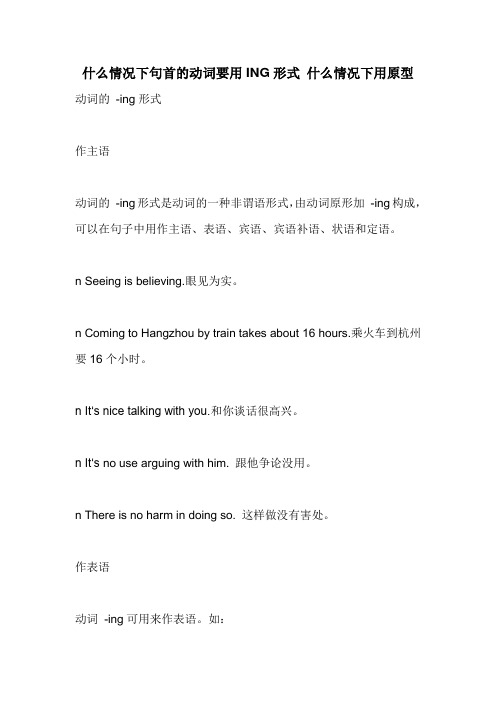
什么情况下句首的动词要用ING形式什么情况下用原型动词的-ing形式作主语动词的-ing形式是动词的一种非谓语形式,由动词原形加-ing构成,可以在句子中用作主语、表语、宾语、宾语补语、状语和定语。
n Seeing is believing.眼见为实。
n Coming to Hangzhou by train takes about 16 hours.乘火车到杭州要16个小时。
n It‘s nice talking with you.和你谈话很高兴。
n It‘s no use arguing with him. 跟他争论没用。
n There is no harm in doing so. 这样做没有害处。
作表语动词-ing可用来作表语。
如:n This food smells inviting.n My favorite sport is swimming.n Their job is cleaning the window.作宾语1.动词-ing形式可以用作动词、短语动词和介词的宾语。
n I warned her against driving fast.n Jim dislikes eating chocolate.2.有些动词和动词短语后接作宾语的非限定性动词时只能是-ing分词,常见的这类动词有:admit,acknowledge,advise,appreciate,avoid,delay,deny,dislike,enjoy,excuse,escape,fancy,finish,forgive,face,endure,involve,give up,imagine,mention,mind,miss,pardon,practise,require,resent,resist,suggest,recall,resist,understand等。
n The doctor advised taking more exercise.n I suggest doing it in a different way.3.大部分“动词+介词”短语动词,只能后接动词-ing作宾语。
动词后面加ing的动词

用法归纳:有的动词或短语动词后只能用动名词而不能接不定式。
如allow, permit(允许), consider(考虑), suggest, advice(建议), suggest, advice(反复; 不停), finish(完成), imagine(想象), practise(练习), understand(明白), appreciate, enjoy(喜欢), miss(错过; 怀念), prevent(阻止), forbid(禁止), escape(避免), include(包括), forgive, pardon, excuse(原谅), dislike(厌恶), discuss(讨论), report(报道), admit(承认), mind(介意), risk(冒险), can’t stand(不能忍受), burst out(突然开始), feel like(想要), insist on(坚持), delay, put off(推迟), give up(放弃), be busy(忙于), be worth(值得)等。
高中阶段能接-ing分次作宾语的常见动词:mind(介意), suggest(建议), enjoy(欣赏,), admit(承认), appreciate (感激,欣赏), avoid(避免), delay(推迟), dislike(不喜欢,厌恶), escape(逃脱), finish(完成), forgive(宽恕), imagine(想象), keep (保持), miss(错过), practise(训练), resist(抵抗,抵制), risk (冒险), deny(拒绝,否认), consider(考虑)等。
高中阶段常见的带介词to的短语,后接-ing分词或名词。
如:admit to(承认), contribute to(捐助、贡献), get down to(着手做), give way to(让位于),keep to (坚持、遵守), lead to (导致),look forward to(期待), take to(从事), turn to (求助于), stick to (忠于、坚持), point to(指向、表明), see to (注意、处理), be used to (习惯于), devote oneself to (献身于), be equal to (胜任的、等于), be familiar to (为……熟悉).有些动词既能接不定式,又能接-ing分词,含义有所不同:①forget, remember, regret等词后面接不定式表示不定式动作后于谓语动作,而后接-ing分词作宾语表示分词动作先于谓语动作。
动词ing用法归类总结好
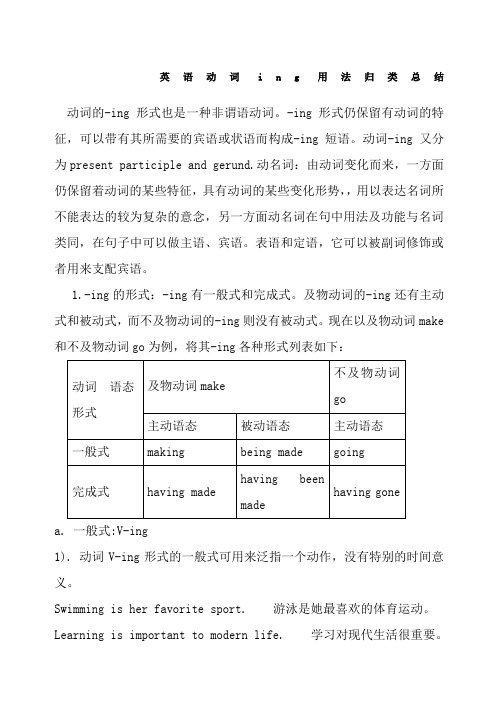
英语动词i n g用法归类总结动词的-ing形式也是一种非谓语动词。
-ing形式仍保留有动词的特征,可以带有其所需要的宾语或状语而构成-ing短语。
动词-ing 又分为present participle and gerund.动名词:由动词变化而来,一方面仍保留着动词的某些特征,具有动词的某些变化形势,,用以表达名词所不能表达的较为复杂的意念,另一方面动名词在句中用法及功能与名词类同,在句子中可以做主语、宾语。
表语和定语,它可以被副词修饰或者用来支配宾语。
1.-ing的形式:-ing有一般式和完成式。
及物动词的-ing还有主动式和被动式,而不及物动词的-ing则没有被动式。
现在以及物动词make 和不及物动词go为例,将其-ing各种形式列表如下:a. 一般式:V-ing1). 动词V-ing形式的一般式可用来泛指一个动作,没有特别的时间意义。
Swimming is her favorite sport. 游泳是她最喜欢的体育运动。
Learning is important to modern life. 学习对现代生活很重要。
2). 动词V-ing形式的一般式可用来表示与谓语动词同时发生的动作。
They went out of the classroom, talking and laughing. 他们有说有笑地走出教室。
3). 动词V-ing形式的一般式有时也可表示在谓语动词的动作之前或之后发生的动作。
I remembered sending him an e-mail last week. 我记得上星期给他发过一份电子邮件。
He suggested taking my daughter to the zoo the next Sunday.他建议下个星期天带我女儿去动物园。
?b.完成式: having done1.动词V-ing形式的完成式表示一个已完成的动作,这个动作发生或完成在谓语动词表示的动作之前。
初中英语语法记忆小口诀

英语语法记忆口诀1.初中阶段常见的以O结尾的名词变复数需加-es的,可以这样记忆:两人两菜(Negro,hero,potato,tomato);一句话(Negroes and heroes like to eat potatoes and tomatoes)生命的加-es (如:heroes,phatoes),无生命的加—es (如:zoo zoos, pianopianos).2.某国人变复数中日不变英法变,其余-S加后面。
3.人称代词主格、宾格记忆口诀人称代词分主、宾,只有八对要区分;你(们)、它主、宾同形,其余主、宾要分清。
4.人称代词排序口诀人称代词并列观,注意顺序礼貌见;单数人称二、三、一,复数人称一、二、三;麻烦事情“我"站前,其他人称没意见;两性并用为三单,男先女后是习惯。
5.形容词性物主代词与名词性物主代词之间词形转换口诀记忆法一变:my变mine,二留:his,its不变;三加尾:其余直接加-S。
6.反身代词的构成规律记忆口诀反身代词有规律,第三人称宾格加,其余开头用物主,复数—ves替—f7.不定冠词a,an用法口诀冠词a,an两种帽,单数可数名词要;选帽只要听读音,不看字母能做到;若是元音来开头,一定需要选an帽;辅音起首戴a帽,记住规律别乱套.8.定冠词the的用法记忆口诀特指、重提和唯一,岛屿、海峡和海湾;海洋、党派、最高级,沙漠、河流与群山;方位、顺序和乐器,年代、团体与机关;船名、建筑和组织,会议、条约与报刊;姓氏复数、国全名,记住定冠the加在前。
9.零冠词用法口诀月份、星期、节假洲,呼语、头衔职务前;三餐、球类、惯用语,学科、棋类名词前。
10.英语基数词巧记口诀英语数词不难记,找出规律很容易;一至十二词不同,一个一个单独记;后面加teen变十几,thirteen,fifteen辩仔细;Eighteen只有一个t,两个音节辩清晰;二十至九十后加ty,twenty不同重点记;Fouty去掉字母u,thirty,fifty更出奇;十位数后个位数,表示数值几十几;按序排列不费力,连字符号莫丢弃。
- 1、下载文档前请自行甄别文档内容的完整性,平台不提供额外的编辑、内容补充、找答案等附加服务。
- 2、"仅部分预览"的文档,不可在线预览部分如存在完整性等问题,可反馈申请退款(可完整预览的文档不适用该条件!)。
- 3、如文档侵犯您的权益,请联系客服反馈,我们会尽快为您处理(人工客服工作时间:9:00-18:30)。
只能接-ing分词作宾语的动词
安静!他还没有讲完。
16. Have you finished typing that letter?
你把那封信打好了没有?
17. Imagine earning that much money!
想想看,竟赚那么多的钱!
18.Can you imagine living without electricity?
你能想象没有电的生活吗?
19. He recommended reading the book before seeing the movie.
他建议先看这本书,再去看这部电影。
20. If you go to London, we recommend visiting Tate Modern.
如果你去伦敦,我们建议你去参观泰特现代美术馆。
21. Did she mind not getting the job?
她没得到这份工作是不是很介意?
22. Would you mind waiting outside?
你在外面等好吗?
23. I suggested going in my car.
我提议坐我的车去。
24. I suggest wearing something warm.
我建议穿得暖和些。
介词to
pay attention to…
look forward to…
be/get used to…
devote…to
make a contribution to…
prefer doing A to doing B
1. We must pay attention to listening to the teacher in class.
在课堂上,我们必须集中精力听老师讲课。
2. My mother says she’s looking forward to meeting you.
我母亲说她盼望着与你见面。
3. We’re really looking forward to seeing you again.
我们非常盼望能再见到你。
4. I’m used to getting up early.
我习惯早起。
5. I’m not used to eating so much at lunchtime.
我不习惯午饭吃那么多。
6. He devoted his energies to writing films.
他倾力创作电影剧本。
7. Mr. Smith devoted all his life to helping the disabled.
史密斯先生毕生致力于帮助残疾人。
8. He devoted himself to teaching in the mountain village.
他致力于在那个山村教书。
9. Everyone should make a contribution to protecting the environment.
每个人都应该为保护环境做出贡献。
10. I prefer skating to skiing.
比起滑雪,我还是喜欢溜冰。
11. While he was in the office he preferred doing something to doing nothing.
当他在办公室时,他宁愿做点什么事,而不愿意无所事事。
其它常见含介词后接-ing分词的短语How/What about…?
worry about (not) doing
be crazy about
be fond of
be good at
be interested in
insist on
way
before/after doing sth.
1. How about going for a meal?
去吃饭好不好?
2. How about putting the sofa closer to the window?
把沙发挪得离窗户近一些好吗?
3. What about going to a movie?
去看场电影如何?
4. You shouldn't worry about not having breakfast.
你不必担心没有早饭吃。
5. That boy is crazy about playing computer games.
那男孩对玩电脑游戏着了迷。
6. The child is fond of playing the piano.
这个孩子喜欢弹钢琴。
7. Nick has always been good at finding cheap flights.
尼克总能找到价格便宜的航班。
8. She’s good at making things.
她很会做东西。
9. Sheila’s interested in starting her own business.
希拉很想开办自己的公司。
